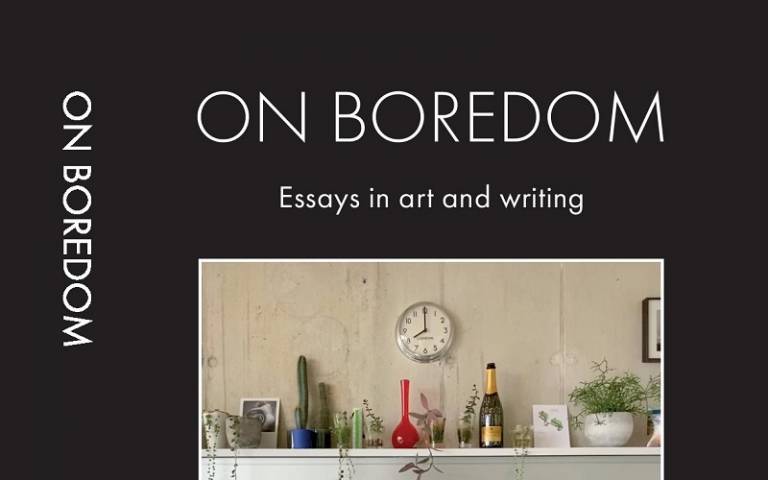VIRTUAL IAS Book Launch: On Boredom - Essays in Art and Writing
27 April 2021, 6:00 pm–7:00 pm

We are very pleased to launch 'On Boredom - Essays in Art and Writing', edited by Susan Morris and Rye Dag Holmboe. Hosted by Professor Briony Fer (UCL)
This event is free.
Event Information
Open to
- All
Availability
- Yes
Cost
- Free
Organiser
-
Institute of Advanced Studies
Please watch the recording below:
This is the first book to come out of the Centre for the Study for the Contemporary Art, in collaboration with the IAS, following a conference held in the IAS in December 2017.
What do we mean when we say that we are bored? Or when we find a subject boring? Contributors to On Boredom: Essays in art and writing, which include artists, art historians, psychoanalysts and a novelist, examine boredom in its manifold and uncertain reality. Each part of the book takes up a crucial moment in the history of boredom and presents it in a new light, taking the reader from the trials of the consulting room to the experience of hysteria in the nineteenth century. The book pays particular attention to boredom’s relationship with the sudden and rapid advances in technology that have occurred in recent decades, specifically technologies of communication, surveillance and automation.
This launch will focus attention on the question of boredom in the time of Covid-19. The book does already address this in a coda by Michael Newman (below). All of the contributors will be involved in the launch, including artists, theorists, art historians, writers and psychoanalysts (Susan Morris, Rye Holmboe, Michael Newman, Josh Cohen, Anoushka Grose, Tom McCarthy, Matthew Hale, Margaret Iversen, Briony Fer, and ending the event with a set from the artist Martin Creed).
If boredom is an affect that is epochal and in that respect an ‘attunement’, it will have been transformed under the impact of a genuine event. The Covid-19 pandemic, affecting all of mankind, is clearly such an event. To date boredom has been understood in psychological, existential and historical terms which are all human-centred. However, the pandemic both connects and displaces the human with respect to micro and macro temporalities, from the cellular and viral to the climatic and the anthropocene. What place can boredom have at these scales? The long stretches of lockdown have created new occasions for boredom, and also made explicit that the different kinds of boredom reflect social inequality, as they have done in the past, when the ennui of the monied is not the same as boredom with repetitive work. Generative boredom, if such can still occur, is the privilege of those who have the time and space for it. By forcing people into isolation, or into tight ‘bubbles’, the circumstances of the pandemic bring to the fore that boredom, unlike for example shame, is not a social affect. What is shared, rather, is what alleviates it: banter, humour, gossip and storytelling. This alleviation is not the same as distraction because it has to do with the connection with others. If the ‘great boredom’ was supposed to be an orientation towards everything in the mode of negation or withdrawal, including from distraction, then the pandemic, socially divisive as it may be, changes both the relation to the whole and the experience of isolation. Boredom has always involved a problem with desire and the future. Today it encounters the way surveillance capitalism monetises anticipated behaviours and decisions, thereby pre-empting potentiality, including that held in reserve in supposed boredom. If, under the pandemic, languor, sadness or the daily struggle alternate with sheer panic, what then? Would boredom finally be revealed as the hither side of a different kind of connectedness?
This book will be published by UCL Press on 21st April: https://www.uclpress.co.uk/products/170147
All welcome. An event link will be announced on this webpage. Please register to attend at https://ias-onboredom.eventbrite.co.uk
Please do not hesitate to contact us if you need assistance on the day, and follow this FAQ link for more information and to read our virtual events code of conduct. All of our events are free, but you can support the IAS here.
 Close
Close

